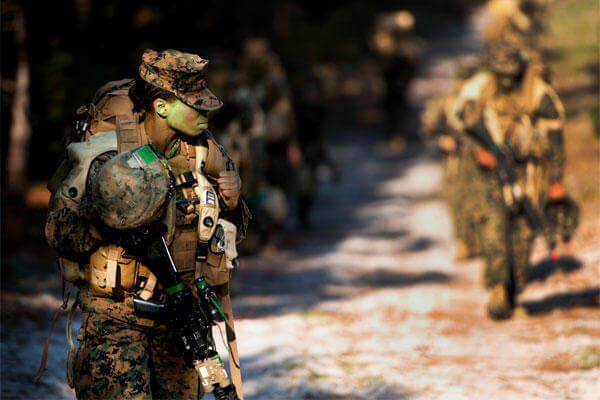Navy Secretary Ray Mabus has given Marine Corps brass two weeks to submit a plan to train male and female recruits together at boot camp and fully integrate officer candidate school.
He's also calling for the Marines to make all job titles gender-neutral as the service opens currently closed ground combat jobs to women.
In a Jan. 1 memo obtained by Military.com and first reported by Marine Corps Times, Mabus ordered the Corps to send him a detailed plan by Jan. 15 for making boot camp and officer training coed. He also requested that the Marines provide him with a "subject matter expert" on the issue. The plan should identify where training is already integrated by gender, where it is separate, and how the Marines will work to fully integrate all training, Mabus said.
"Colocation does not meet the requirement for gender integrated training," Mabus wrote. "This plan will complete [the Department of the Navy's] implementation plan and ensure full integration of female sailors and Marines within the DON in accordance with [Defense Secretary Ashton Carter's] guidance."
A Marine Corps spokesman, Capt. Philip Kulczewski, confirmed that the Corps had received the memo but offered no further comment.
Mabus also included a memo for Marine Corps Commandant Gen. Robert Neller requesting that he review Marine Corps job titles and remove "man" from applicable job titles to make them "gender-integrated." This means military occupational specialties ranging from 0311, infantryman, to 0321, reconnaissance man, could soon get new names. Mabus demanded this be done and a report submitted to him no later than April 1, 2016, the services' final deadline for opening all jobs to women.
The Navy Secretary also sounded a warning note to Neller about a list of "critical information requirements" the Corps included in the integration plan submitted to Carter this month.
That list of developments to be monitored closely include:
--Indications of decreased combat readiness or effectiveness;
--Indications of increased risk to Marines in previously closed units, including incidents of sexual assault and harassment, and hazing;
--Indications of a lack of career viability for female Marines in newly opened ground combat jobs;
--Indications that Marine commands and culture is unreceptive to the inclusion of women in ground combat units; and
--Indications that moral or cohesion is degrading in newly opened units.
None of those potential problems should serve to hinder the rollout of the new integration policy, Mabus said.
"As the Marine Corps adds elements such as the leadership plan that includes the goals of female leadership teams, cohesive cohorts, and mentors, I expect you will ensure that a worthwhile goal does not unreasonably delay or prevent the execution of a policy imperative," he wrote.
The strongly worded admonition underscores tensions between the Marine Corps and Mabus' office over the issue of women in combat jobs.
The Marine Corps was the only service to request that some combat job fields remained closed to women, citing data from an internal experiment that showed that mixed-gender groups of Marines performed combat tasks more slowly and even shot less accurately than all-male groups.
Mabus made clear he wouldn't countenance the Marines' objections to women serving in combat and publicly criticized the Corps' study, saying negative attitudes towards women on the part of those overseeing the research had served to "almost [presuppose] the outcome."
To date, the Marines have strongly defended their choice to keep enlisted boot camp segregated by gender, even though all the other services conduct coed recruit training.
In August, Marine officials told this reporter that dividing boot camp by gender allowed recruits to learn from same-sex role models, limited distractions, and created a safe space to discuss topics such as sexual assaults that had occurred prior to enlistment.
"In general, [recruits] arrive with immature, undeveloped and unfocused thoughts on professionalism and professional conduct," Marine Corps Training and Education Command spokesman Anton Semelroth said at the time. "The only thing they have in common is their desire to be a Marine. By capitalizing on that desire, recruit training transforms these individuals from many diverse backgrounds into Marines imbued with a common set of values and standards."
That reasoning came under scrutiny this summer with the firing of Lt. Col. Kate Germano, commander of 4th Recruit Training Battalion at Parris Island, South Carolina -- the only unit in the Marine Corps in which female recruits are currently trained.
An investigation into Germano's conduct at the battalion found she was "hostile" and "abusive," but her supporters claim she came under fire for trying to bring training standards in her unit up to the level of the three male recruit battalions at Parris Island. In an editorial published by The New York Times, Germano said the incident and her experience at the unit served to prove that training female Marines separately encouraged underperformance and lower expectations.
Notably, the issue of coed training has been studied before by the Pentagon.
In 1997, the Defense Department assembled a bipartisan panel to examine the implications of gender-integrated enlisted training. At the time, the panel concluded that the coed approach used in Army, Navy and Air Force recruit training resulted in "less discipline, less unit cohesion, and more distraction from the training programs."
--Hope Hodge Seck can be reached at hope.seck@monster.com. Follow her on Twitter at @HopeSeck.






























